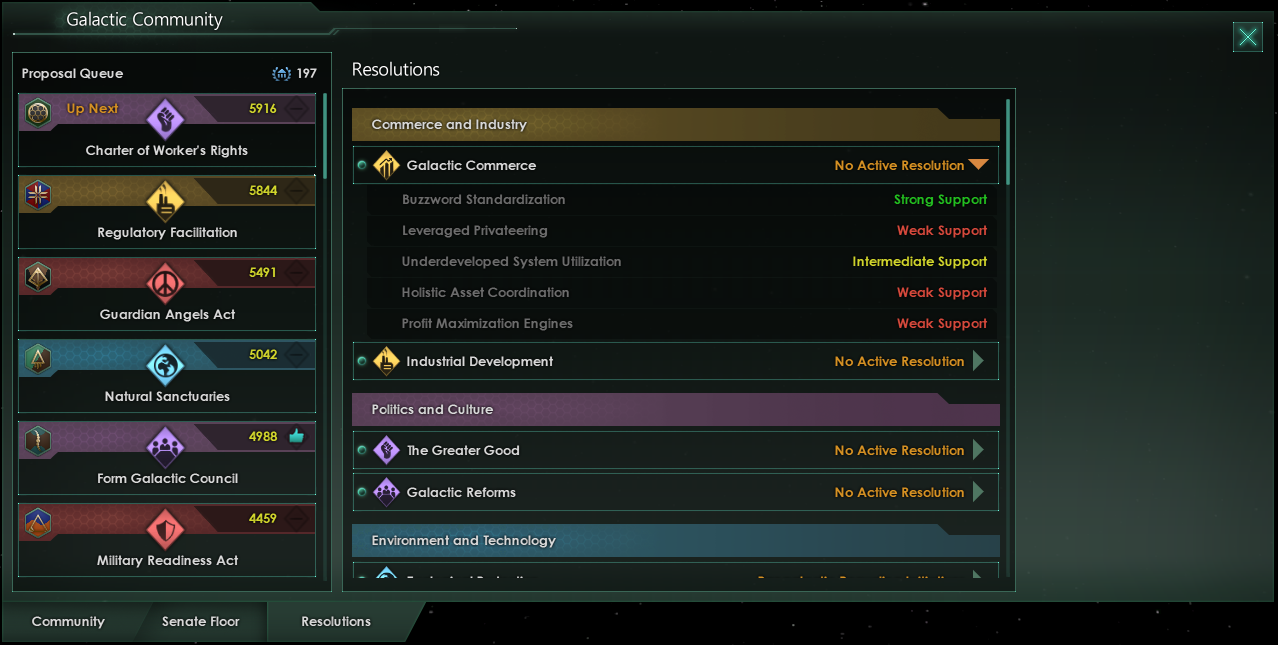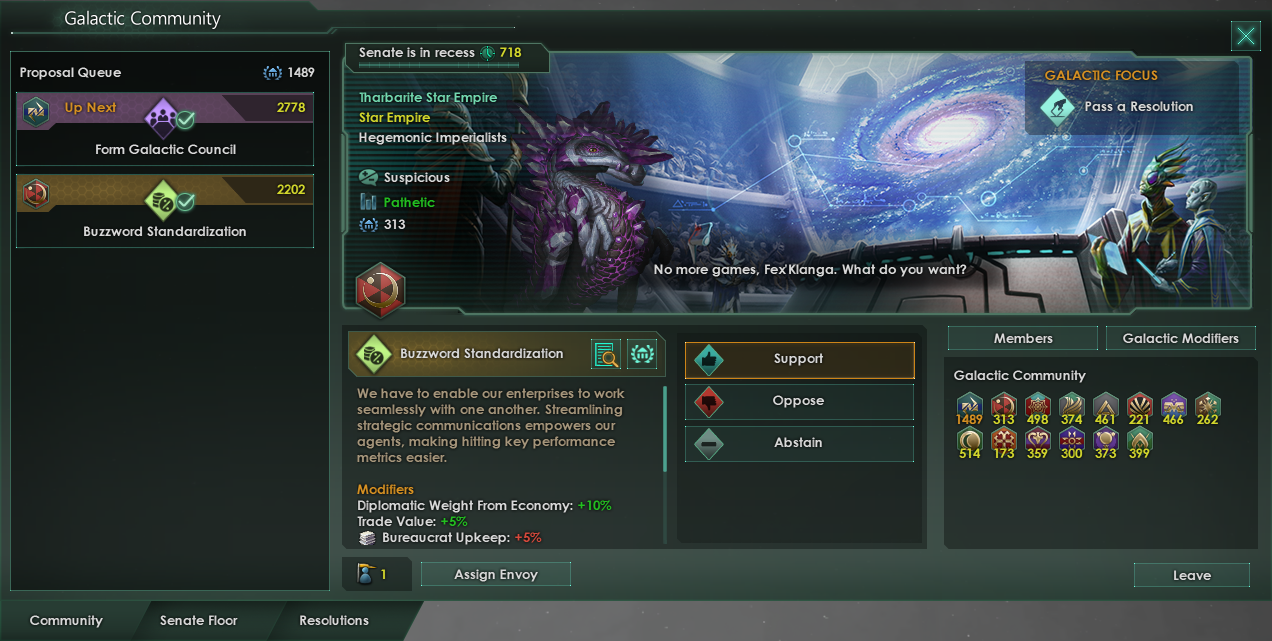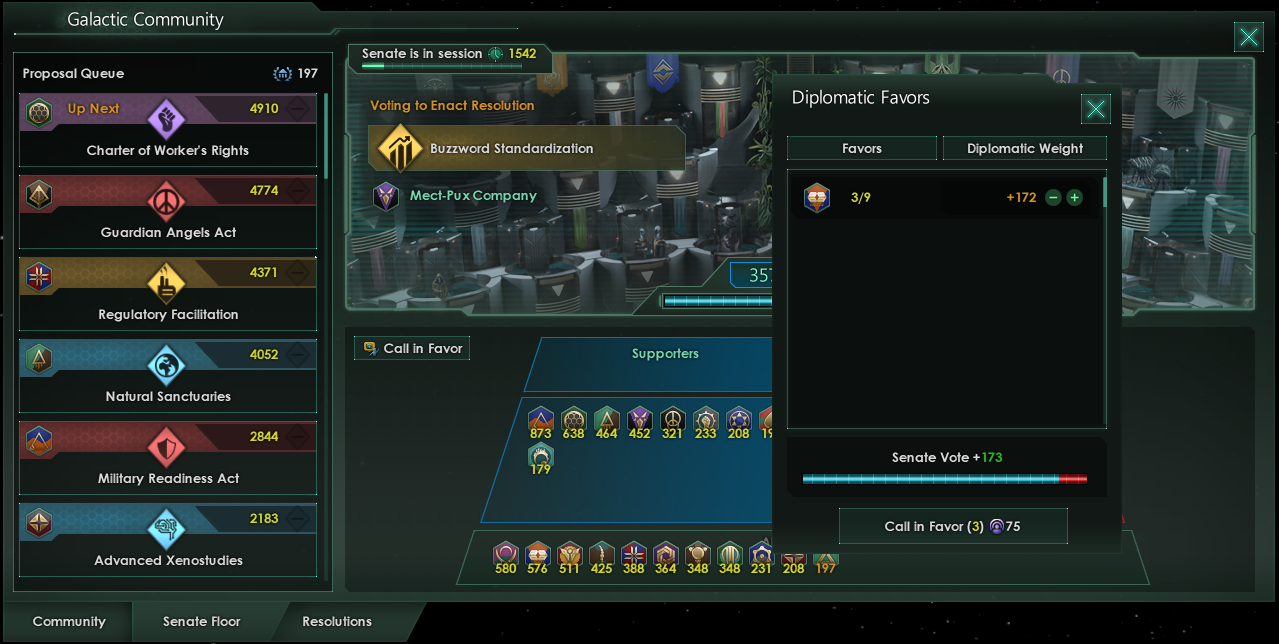Hello everyone!
Today we will be talking about a new feature coming with Stellaris: Federations – the Galactic Community!
The Galactic Community is very similar to a United Nations in space. Members can propose and vote on Resolutions, which are laws that affect all the member empires.
Resolutions
The Resolutions are intended to be divisive, so that even empires that are allies can have very different agendas when it comes to which Resolutions should be passed.

Resolutions exist in categories and have a couple of steps in each category.

Go big or go home.
Passing a Resolution
The first step to passing a Resolution is proposing it! Any member of the Galactic Community can propose a Resolution, but they can only have one ongoing. When a Resolution is proposed, it moves into the proposal queue.

The Galactic Community dealing with matters of critical importance to the continued well-being of the galaxy and all of its inhabitants.
Only one Resolution can be voted on at a time on the senate floor, and the proposal that moves into session next will be the proposed Resolution with the highest amount of Diplomatic Weight supporting it.

Senate in session, voting on a Resolution.
When a Resolution is in session and is being voted on, empires can support, oppose or abstain. Voting for or against will add an empire’s Diplomatic Weight to either side, and when the current session ends the votes will be counted. A Resolution will pass if the Diplomatic Weight in favor of the Resolution is higher than the amount opposing it.
Diplomatic Weight
Diplomatic influence will be calculated using a new scoring system called Diplomatic Weight, and it will be composed of things like economy, technology, fleet power to name a couple of examples.

Cooperative Diplomatic Stance increases Diplomatic Weight by +25%.
There will also be a number of different ways to influence how much Diplomatic Weight you are getting from different sources. There are Resolutions that can modify how much Diplomatic Weight you gain from your economy, and there are Diplomatic Stances that increase how much Diplomatic Weight you gain from fleet power or other areas (more on Diplomatic Stances later!).
So as you can see, there are many different ways to make yourself more influential on a diplomatic, galactic stage!
Favors
For Resolutions, empires have the possibility to call in favors to strengthen their votes. An empire can owe another empire up to 10 favors, and each favor is worth 10% diplomatic weight. For example, if an empire calls in 10 favors, they can add 100% of the other empire’s diplomatic weight to theirs. Calling in favors this way will only affect votes on Resolutions. This also means that favors will work the same between player empires as it will between player and AI empires.

Calling in favors costs Influence.
Favors can also be used to increase the likelihood of AI empires accepting diplomatic deals.
Favors can be traded through the trade diplomatic action.
Galactic Council
It is possible to reform the Galactic Community to include a Galactic Council. The council will be composed of a number of empires with the highest Diplomatic Weight. By default, the council will have 3 members, but the number can be changed through Resolutions.
The Galactic Council also gets access to special powers such as veto rights or emergency measures.
Veto rights allows a council member to veto a Resolution that is currently in the proposal queue.
While the galactic senate is in recess it is possible for Galactic Council members to declare a proposed Resolution an emergency. This will immediately put the senate into session and will initiate a vote on the emergency Resolution.
Galactic Focus
It is possible for the Galactic Community to set a Galactic Focus. This will mean the Galactic Community together have decided to achieve something or to deal with a crisis.
There will be Resolutions to declare the galactic invaders a threat to the galaxy, which means it will be against galactic law to have closed borders to any other Galactic Community member while the crisis is ongoing.
The Galactic Market is now founded through a Galactic Focus to “Found the Galactic Market”. When the Resolution to form the Galactic Market has been passed, the bidding process to be the market founder will continue as it previously did.
Creating/Joining/Leaving the Galactic Community
When an empire has established communications with half of the empires in the galaxy, an event will trigger to suggest the formation of a Galactic Community. This means that forming the Galactic Community will be similar to how it used to work to form the Galactic Market.
It is possible to join the Galactic Community (and to see it!) as soon as you have established communications with any member of it.
Leaving the galaxy community is something an empire might choose to do if they become the target of too many sanctions or if there are too many Resolutions that negatively impact them.
----
Next week we will be showing all the Origins!
Today we will be talking about a new feature coming with Stellaris: Federations – the Galactic Community!
The Galactic Community is very similar to a United Nations in space. Members can propose and vote on Resolutions, which are laws that affect all the member empires.
Resolutions
The Resolutions are intended to be divisive, so that even empires that are allies can have very different agendas when it comes to which Resolutions should be passed.

Resolutions exist in categories and have a couple of steps in each category.

Go big or go home.
Passing a Resolution
The first step to passing a Resolution is proposing it! Any member of the Galactic Community can propose a Resolution, but they can only have one ongoing. When a Resolution is proposed, it moves into the proposal queue.

The Galactic Community dealing with matters of critical importance to the continued well-being of the galaxy and all of its inhabitants.
Only one Resolution can be voted on at a time on the senate floor, and the proposal that moves into session next will be the proposed Resolution with the highest amount of Diplomatic Weight supporting it.

Senate in session, voting on a Resolution.
When a Resolution is in session and is being voted on, empires can support, oppose or abstain. Voting for or against will add an empire’s Diplomatic Weight to either side, and when the current session ends the votes will be counted. A Resolution will pass if the Diplomatic Weight in favor of the Resolution is higher than the amount opposing it.
Diplomatic Weight
Diplomatic influence will be calculated using a new scoring system called Diplomatic Weight, and it will be composed of things like economy, technology, fleet power to name a couple of examples.

Cooperative Diplomatic Stance increases Diplomatic Weight by +25%.
So as you can see, there are many different ways to make yourself more influential on a diplomatic, galactic stage!
Favors
For Resolutions, empires have the possibility to call in favors to strengthen their votes. An empire can owe another empire up to 10 favors, and each favor is worth 10% diplomatic weight. For example, if an empire calls in 10 favors, they can add 100% of the other empire’s diplomatic weight to theirs. Calling in favors this way will only affect votes on Resolutions. This also means that favors will work the same between player empires as it will between player and AI empires.

Calling in favors costs Influence.
Favors can also be used to increase the likelihood of AI empires accepting diplomatic deals.
Favors can be traded through the trade diplomatic action.
Galactic Council
It is possible to reform the Galactic Community to include a Galactic Council. The council will be composed of a number of empires with the highest Diplomatic Weight. By default, the council will have 3 members, but the number can be changed through Resolutions.
The Galactic Council also gets access to special powers such as veto rights or emergency measures.
Veto rights allows a council member to veto a Resolution that is currently in the proposal queue.
While the galactic senate is in recess it is possible for Galactic Council members to declare a proposed Resolution an emergency. This will immediately put the senate into session and will initiate a vote on the emergency Resolution.
Galactic Focus
It is possible for the Galactic Community to set a Galactic Focus. This will mean the Galactic Community together have decided to achieve something or to deal with a crisis.
There will be Resolutions to declare the galactic invaders a threat to the galaxy, which means it will be against galactic law to have closed borders to any other Galactic Community member while the crisis is ongoing.
The Galactic Market is now founded through a Galactic Focus to “Found the Galactic Market”. When the Resolution to form the Galactic Market has been passed, the bidding process to be the market founder will continue as it previously did.
Creating/Joining/Leaving the Galactic Community
When an empire has established communications with half of the empires in the galaxy, an event will trigger to suggest the formation of a Galactic Community. This means that forming the Galactic Community will be similar to how it used to work to form the Galactic Market.
It is possible to join the Galactic Community (and to see it!) as soon as you have established communications with any member of it.
Leaving the galaxy community is something an empire might choose to do if they become the target of too many sanctions or if there are too many Resolutions that negatively impact them.
----
Next week we will be showing all the Origins!




